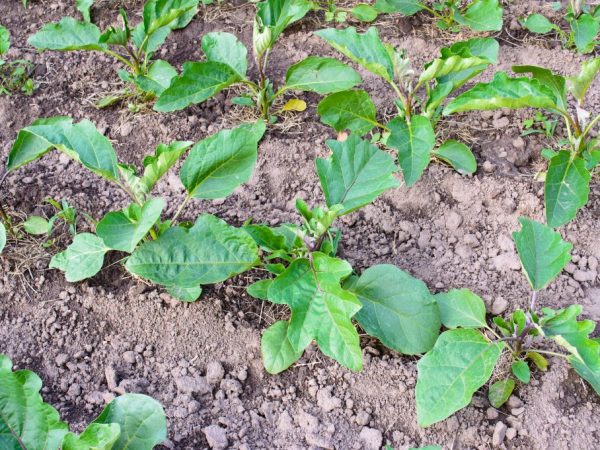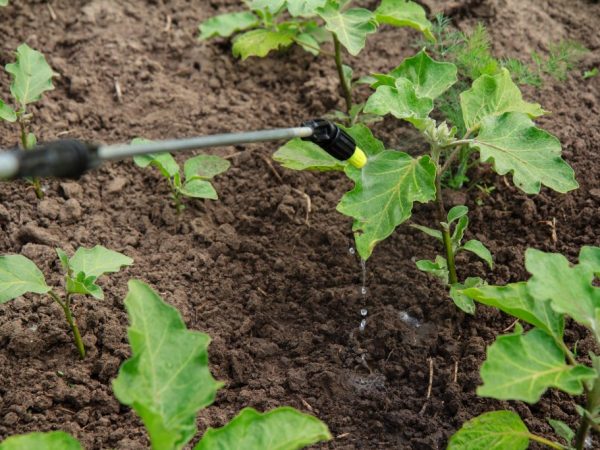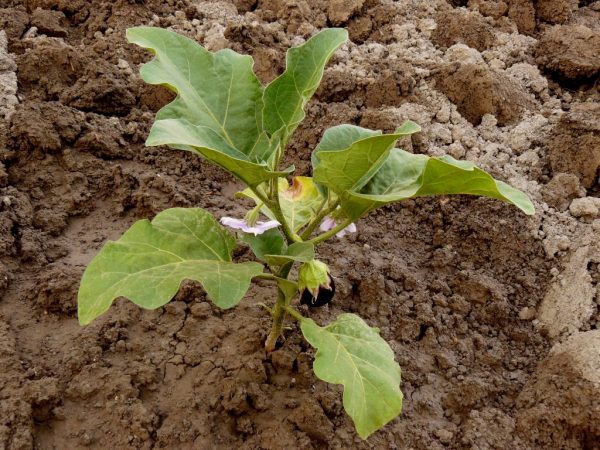Feeding eggplant seedlings
Top dressing is a must to get strong, healthy shoots. When growing, it is recommended to feed eggplant seedlings 2 times. The first feeding of eggplants is carried out during or after the pick. The second time, fertilizers are applied 8-10 days before planting in the ground.

Feeding eggplant seedlings
Mineral fertilizers
It is recommended to feed eggplant seedlings with the help of mineral complexes. They are often added to the first feeding of eggplant seedlings.
The fertilization schedule is applicable to each variety. Minerals are also used for feeding eggplants in open ground or in a greenhouse made of glass, film, polycarbonate. They are brought into the holes during landing. This helps the seedlings take root. The funds are diluted in the amount required for a single use.
Loose preparations are not recommended to be stored in torn containers. Pour the remainder after use. A glass, plastic jar with a sealed lid will do. Eggplant seedlings are fertilized in liquid form at the root. Avoid contact with leaves.
Fertilizing eggplants with chemicals from chemical compounds is safe if precautions are taken when feeding at home:
- the solution is prepared in the open air;
- use a separate container for solution, dishes for food are not suitable;
- do not eat until the end of work;
- if they get on hands, they are immediately washed with soap and water;
- when swallowing any amount of the drug, drink a large amount of water, take activated charcoal;
- substances are stored out of the reach of children.
Kemira suite
Kemira Lux, a complex universal preparation, helps to feed the eggplants for the growth of a green, root part. The introduction of Kemira at the stage of growing seedlings stops soil depletion, increases the plant's resistance to unfavorable conditions, and helps to speed up adaptation when picking.
Powder fertilizer contains an optimal proportion of macro-, microelements: total nitrogen. - 16%, nitrogen ammon. - 7.9%, nitrogen nitr. - 8.1%, phosphorus - 21%, potassium - 27%. Small amounts of iron are present - 0.1%, boron - 0.02%, copper - 0.01%, manganese - 0.1%, zinc - 0.01%, molybdenum - 0.002%.
The drug is used for:
- watering at the root - 20 g is stirred in 1 liter of water;
- wick irrigation - 0.5 g per 1 liter of water;
- spraying roots during transplantation - 10 g per 1 liter of water.
Kemira is classified as low-hazard according to GOST (class 4). It does not contain toxins, heavy metals, does not accumulate in the soil.
Kristalon

Top dressing accelerates plant growth
Top dressing of eggplants after picking or before it is carried out with the universal preparation "Kristalon". It is released in crystal form and does not contain chlorine, which makes it safer for seedlings. The desired effect is achieved due to the fact that the elements are combined with organic substances. This makes them easy to digest. The composition is similar to Kemir, but the ratio of substances changes.
For vegetables, blue and yellow Kristalon are suitable, especially when transplanted into acidic clay soil.They are diluted with water to a concentration of 0.7-1.5 g / 1 l of water.
Correct feeding of eggplant seedlings accelerates growth, improves resistance to temperature extremes, and accelerates the flowering period. The drug is combined with pesticides.
Among the advantages of this eggplant feeding, the gradual dissolution of crystals in the soil is noted. Minerals feed the culture for a long time.
Nutrisol
The product is a water-soluble fertilizer for eggplant. It contains 11 chelated minerals. Calcium (8%) contributes to a more intense color of leaves, improves flowering, fruiting.
The product has an acidic Ph, immediate action. It dissolves quickly, absorbed at any level of water hardness. In alkaline, calcareous soils, it helps the root system to absorb the necessary elements.
15-20 g of the drug is diluted with 10 liters of water. The solution is applied at the root. The absence of chlorine and sodium minimizes the likelihood of burning the trunk and root system when feeding.
Organic fertilizers
They begin to feed eggplants using folk methods before planting. Before applying, organic fertilizers are insisted, diluted with the ground. Fresh manure is not used: it contains too much nitrogen, and a large amount of the element slows down the growth of the crop - it is more difficult to plant it in the ground.
The mixture acts on the root system when its temperature is over 22 ° C.
The composition of fertilizing for eggplant seedlings depends on the type of soil in which the sprouts are grown:
- loamy - sawdust, manure, peat in a ratio of 1: 1: 2;
- clayey - manure, sawdust, sand, peat (1: 1: 1: 2);
- sandy - humus, sawdust, clay soil (1: 1: 2).
It is recommended to feed vegetables with urea, mullein. The solution is prepared as follows: 1 bucket of mullein, 1 tbsp. urea, 100 liters of water. Organic matter can be exchanged for 1 bucket of poultry droppings and 2 tbsp. nitrophosphate. The amount is adjusted according to the proportion. Before making, insist 3-5 days.
Foliar dressing is carried out with folk remedies: ammonia, iodine, boric acid. They are also fed with peppers and tomatoes. Take 20-50 ml of each substance and dilute in 5 l of water. Next, the soil is fertilized with a solution.
The procedures enhance nitrogen metabolism, increase the immunity of the vegetable. Top dressing is carried out after planting.
Stimulants

Stimulants Benefit Eggplant
Stimulants are used for root and foliar feeding of eggplants. As monoforming drugs are not used. They are added together with minerals to the first complementary food. They are able to enhance the beneficial properties of other elements: nitrogen, potassium, phosphorus, facilitate the cultivation of crops in the open field, greenhouse.
Stimulants act at the cellular level. They activate the biological processes of plants, act slowly and gently.
Stimulants are highly concentrated products. When the drug gets into the undiluted form on the soil, it is sprinkled with earth, the lump of soil is thrown away.
Epin
The chemical preparation "Epin" contains the active ingredient epibrassinolide. It strengthens the shoots, protects against frost, drought, stress. The crop germination increases, growth intensifies, and yields increase. The fruits become marketable.
Soaking seedlings in a solution of the drug is carried out before picking. For 100 g of seedlings, take 100 ml of liquid.
It is recommended to fertilize with epin in a ratio of 0.25 mg (1 ampoule) per 100 ml of water.
Mix well before use. Store the remaining solution in a cool dark place for 2 days. Sun exposure is unacceptable.
The product is not toxic, does not harm people, animals. The product does not pollute the environment.
Zircon
Zircon is used as an immunomodulator. The action of the agent on the plant:
- releases the internal forces of the plant;
- normalizes metabolism;
- protects against contamination with radionuclides, pesticides, heavy metals.
The tool is economical. It is better for them to fertilize at low dilution. It simplifies plant care.
The drug contains esters of hydroxycinnamic acids. They have antiviral, antimicrobial, antitoxic effects.
The drug is used together with organic and mineral fertilizers. 1 small ampoule 0.25 mg is diluted with 1 liter of water. The sprouts are soaked in the solution or the leaves are sprayed.
The substance is not toxic, since it does not accumulate in the soil or plant. But too concentrated a solution can change the state of the soil.
Kornevin
The tool is a biostimulant (phytohormone). It contains 5 g / kg of indolylbutyric acid (IMA). The action is due to irritation of the plant cover when it comes into contact with tissues. The immune system responds with the accumulation of living callus cells and root overgrowth.
Increased immunity contributes to the rapid adaptation of seedlings to transplantation. The root system is strengthened, which makes the plant strong. It tolerates unfavorable external factors more easily: waterlogging, temperature drops, drafts, drought, hypothermia. The drug does not protect against diseases and pests.
- Top dressing is carried out with an aqueous solution of a biostimulator. Powder (5 g) is mixed with 5 liters of water. Consumption - 40-60 ml per sprout.
- During the picking, the root system of the seedlings is kept in the tool. When fertilizing after transplanting, eggplants are watered at the root.
- The substance is classified as safety class 3. Gloves are used during work. Empty containers are not thrown away, but burned.
Conclusion
Planting and transplanting seedlings is stressful for whimsical eggplants. Seedlings require a strong root system to get used to new soil, temperature, humidity. Carrying out 2 necessary dressings makes the sprouts resistant to changes.


